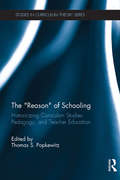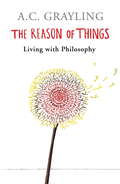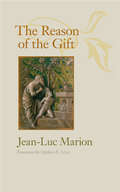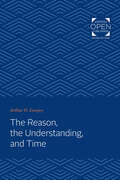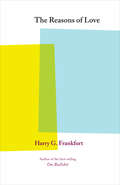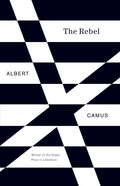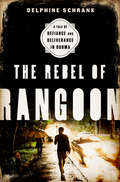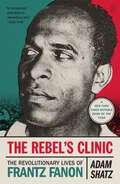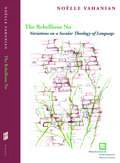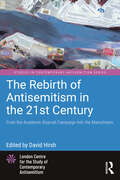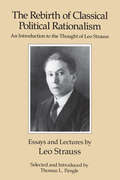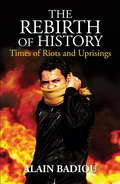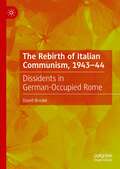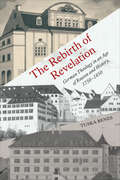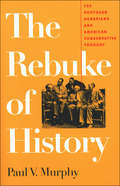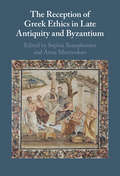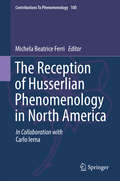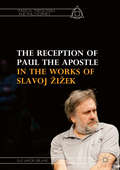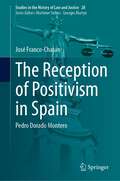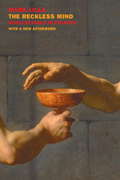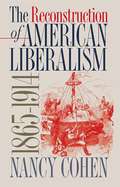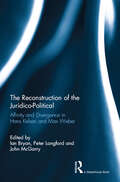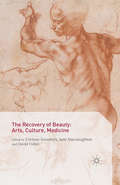- Table View
- List View
The Reason of Schooling: Historicizing Curriculum Studies, Pedagogy, and Teacher Education (Studies in Curriculum Theory Series)
by Thomas S. PopkewitzProblematizing the "reason" of schooling as historical and political, in this book leading international and interdisciplinary scholars challenge the common sense of schooling and the relation of society, education, and curriculum studies. Examining the limits of contemporary notions of power and schooling, the argument is that the principles that order school subjects, the curriculum, and teaching reforms are historical practices that govern what is thought, acted on, and talked about. Highlighting the dynamics of social exclusion, the normalizing of people through curriculum, and questions of social inclusion, The "Reason" of Schooling underscores the urgency for rethinking curriculum research.
The Reason of Things: Living with Philosophy
by A.C. GraylingThe follow-up to THE MEANING OF THINGS which continues A.C. Grayling's philosophical journey through lifeThe most important question we can ask ourselves is: what kind of life is the best? This is the same as asking: How does one give meaning to one's life? How can one justify one's existence and make it worthwhile?How does one make experience valuable, and keep growing and learning in the process - and through this learning acquire a degree of understanding of oneself and the world? A civilised society is one which never ceases debating with itself about what human life should best be. Some would, with justice, say that if we want ours to be such a society we must all contribute to that discussion.This book is, with appropriate diffidence, such a contribution. It consists of a collection of Grayling's regular 'Last Word' columns in the Guardian. This time topics include Suicide, Deceit, Luxury, Profit, Marriage, Meat-eating, Liberty, Slavery, Protest, Guns and War.
The Reason of Things: Living with Philosophy
by Prof A.C. GraylingThe follow-up to THE MEANING OF THINGS which continues A.C. Grayling's philosophical journey through lifeThe most important question we can ask ourselves is: what kind of life is the best? This is the same as asking: How does one give meaning to one's life? How can one justify one's existence and make it worthwhile?How does one make experience valuable, and keep growing and learning in the process - and through this learning acquire a degree of understanding of oneself and the world? A civilised society is one which never ceases debating with itself about what human life should best be. Some would, with justice, say that if we want ours to be such a society we must all contribute to that discussion.This book is, with appropriate diffidence, such a contribution. It consists of a collection of Grayling's regular 'Last Word' columns in the Guardian. This time topics include Suicide, Deceit, Luxury, Profit, Marriage, Meat-eating, Liberty, Slavery, Protest, Guns and War.
The Reason of the Gift (Richard Lectures)
by Jean-Luc Marion Stephen E. LewisThis book represents a continuation of Jean-Luc Marion's work on givenness as a foundational concept. A former student of Jacques Derrida, Marion is known for his work in seventeenth-century French philosophy, for his theory of "God without being," and for his reformulation of phenomenology. Marion's groundbreaking work on givenness is articulated through attentive readings in a striking array of philosophical texts. The four pieces collected here, based on the fall 2008 Richard Lectures at the University of Virginia, expand upon and go beyond the lines of Marion's previous work and exemplify the intersection of his own constructive brilliance with his talent and rigor as a historian of philosophy. Reengaging philosophers long central to Marion's own work (Husserl, Heidegger, Levinas) and highlighting the significance of lesser-known but decisive influences (Natorp, Rickert, Meinong), these lectures will be valuable to readers interested in the ongoing conversation seeking to bridge the divide between Continental and analytic philosophies, particularly through the exploration of common points of origin. These pieces tackle some of the most pressing debates in contemporary European philosophy and offer students of Marion material to ponder as they seek to further understand his influences. Taken together, these essays form an important volume by a major figure in contemporary philosophy.
The Reason, the Understanding, and Time
by Arthur Oncken LovejoyOriginally published in 1961. The Reason, the Understanding, and Time is concerned with the history of the conceptions of reason, ego, time, and other related concepts that enjoyed a great vogue and influence in German philosophy in the last decades of the eighteenth century and the early decades of the nineteenth century. Kant's influence on and relevance to the development of later German epistemology is traced, as is the impact of those ideas on the Transcendentalist movements in England and America as represented by Coleridge, Carlyle, and Emerson. The significance of Jacobi's philosophy, hitherto not fully appreciated by historians, is demonstrated as well as the contribution of the young Schelling. By examining Bergson's letters, Lovejoy throws new light on Bergson's concept of time. Lovejoy's philosophical interpretation is a model of penetrating insight and helpful criticism.
The Reasons of Love
by Harry G. FrankfurtFrom the author of the #1 New York Times bestseller On Bullshit, a profound meditation on how and why we loveIn The Reasons of Love, leading moral philosopher and bestselling author Harry Frankfurt argues that the key to a fulfilled life is to pursue wholeheartedly what one cares about, that love is the most authoritative form of caring, and that the purest form of love is, in a complicated way, self-love. Through caring, we infuse the world with meaning. Caring provides us with stable ambitions and concerns, and it shapes the framework of aims and interests within which we lead our lives. Love is a nonvoluntary, disinterested concern for the flourishing of what we love—and self-love, as distinct from self-indulgence, is at heart of this concern. The most elementary form of self-love is no more than the desire to love, and self-love is simply a commitment to finding meaning in our lives.
The Rebel
by Albert CamusBy one of the most profoundly influential thinkers of our century, The Rebel is a classic essay on revolution. For Albert Camus, the urge to revolt is one of the "essential dimensions" of human nature, manifested in man's timeless Promethean struggle against the conditions of his existence, as well as the popular uprisings against established orders throughout history. And yet, with an eye toward the French Revolution and its regicides and deicides, he shows how inevitably the course of revolution leads to tyranny. As old regimes throughout the world collapse, The Rebel resonates as an ardent, eloquent, and supremely rational voice of conscience for our tumultuous times.Translated from the French by Anthony Bower.
The Rebel of Rangoon: A Tale of Defiance and Deliverance in Burma
by Delphine SchrankAn epic, multigenerational story of courage and sacrifice set in a tropical dictatorship on the verge of massive transformation, The Rebel of Rangoon captures a gripping moment of possibility in Burma. Journalist Delphine Schrank spent four years underground tracking Burmese dissidents whose semi-clandestine existence and fight for democracy remained largely hidden behind their globally celebrated figurehead, Aung San Suu Kyi. With intimate, vivid prose, Schrank follows the inner life of a daredevil young dissident, his friends and rivals, across rural hamlets and flickering internet connections, into prison cells and safe houses, and deep into their own hearts, as they escape spies and outwit interrogators, fall in love or slip into insanity. Through that dissident’s perspective, Schrank unfurls a harrowing account of a country’s efforts to emerge from military dictatorship, how a movement of dissidents came into being, how it almost died, and how it pushed its government to crack apart and begin an irreversible process of political reform. In doing so, Schrank delivers a profoundly human exploration of daring and defiance and of the power and meaning of freedom.
The Rebel's Clinic: The Revolutionary Lives of Frantz Fanon
by Adam ShatzOne of The New York Times's 100 Notable Books of 2024One of the Washington Post's 50 Best Nonfiction Books of 2024Longlisted for the National Book Critics Circle Award for BiographyNamed a best book of 2024 by The New Yorker | Vulture | Los Angeles Review of Books | Foreign Affairs | The New RepublicLonglisted for the 2024 Baillie Gifford Prize for Non-Fiction “Nimble and engrossing . . . [An] exemplary work of public intellectualism.” —Becca Rothfeld, The Washington Post"Undoubtedly the best [biography of Fanon] . . . A remarkable achievement." —Robert J. C. Young, Los Angeles Review of BooksA revelatory biography of the writer-activist who inspired today’s movements for social and racial justice.In the era of Black Lives Matter, Frantz Fanon’s shadow looms larger than ever. He was the intellectual activist of the postcolonial era, and his writings about race, revolution, and the psychology of power continue to shape radical movements across the world. In this searching biography, Adam Shatz tells the story of Fanon’s stunning journey, which has all the twists of a Cold War–era thriller. Fanon left his modest home in Martinique to fight in the French Army during World War II; when the war was over, he fell under the influence of Existentialism while studying medicine in Lyon and trying to make sense of his experiences as a Black man in a white city. Fanon went on to practice a novel psychiatry of “dis-alienation” in rural France and Algeria, and then join the Algerian independence struggle, where he became a spokesman, diplomat, and clandestine strategist. He died in 1961, while under the care of the CIA in a Maryland hospital. Today, Fanon’s Black Skin, White Masks and The Wretched of the Earth have become canonical texts of the Black and global radical imagination, comparable to James Baldwin’s essays in their influence. And yet they are little understood. In The Rebel’s Clinic, Shatz offers a dramatic reconstruction of Fanon’s extraordinary life—and a guide to the books that underlie today’s most vital efforts to challenge white supremacy and racial capitalism.Includes 8 pages of black-and-white photographs
The Rebellious No: Variations on a Secular Theology of Language (Perspectives in Continental Philosophy)
by Noëlle VahanianThis book aims to renew theological thinking by extending and radicalizing an iconoclastic and existentialist mode of thought. It proposes a theology whose point of departure assumes and accepts the critiques of religion launched by Nietzsche, Freud, Marx, and Feuerbach but nevertheless takes theological desire seriously as a rebellious force working within, but against, an anthropomorphic, phallogocentric worldview.As a theology of language, it does not claim any privileged access to some transcendent divine essence or ground of Being. On the contrary, for Noelle Vahanian theology is a strictly secular discourse, like any other discourse, but aware of its limitations and wary of great promises—its own included. Its faith is that this secular theological desire can be a force against the constitutive indifference of thought, and it is a meditative act of rebellion. Aphoristic instead of argumentative, this book offers an original and constructive engagement with such seminal issues as indifference, belief, madness, and love.
The Rebirth of Antisemitism in the 21st Century: From the Academic Boycott Campaign into the Mainstream (Studies in Contemporary Antisemitism)
by David HirshThe Rebirth of Antisemitism in the 21st Century is about the rise of antizionism and antisemitism in the first two decades of the 21st century, with a focus on the UK. It is written by the activist-intellectuals, both Jewish and not, who led the opposition to the campaign for an academic boycott of Israel. Their experiences convinced them that the boycott movement, and the antizionism upon which it was based, was fuelled by, and in turn fuelled, antisemitism. The book shows how the level of hostility towards Israel exceeded the hostility which is levelled against other states. And it shows how the quality of that hostility tended to resonate with antisemitic tropes, images and emotions. Antizionism positioned Israel as symbolic of everything that good people oppose, it made Palestinians into an abstract symbol of the oppressed, and it positioned most Jews as saboteurs of social ‘progress’. The book shows how antisemitism broke into mainstream politics and how it contaminated the Labour Party as it made a bid for Downing Street. This book will be of interest to scholars and students researching antizionism, antisemitism and the Labour Party in the UK.
The Rebirth of Classical Political Rationalism: An Introduction to the Thought of Leo Strauss
by Leo Strauss Thomas L. PangleThis concise and accessible introduction to Strauss's thought provides, for wider audience, a bridge to his more complex theoretical work. Editor Pangle has gathered five of Strauss's previously unpublished lectures and five hard-to-find published writings and has arranged them so as to demonstrate the systematic progression of the major themes that underlay Strauss's mature work.
The Rebirth of History
by Gregory Elliott Alain BadiouIn the uprisings of the Arab world, Alain Badiou discerns echoes of the European revolutions of 1848. In both cases, the object was to overthrow despotic regimes maintained by the great powers--regimes designed to impose the will of financial oligarchies. Both events occurred after what was commonly thought to be the end of a revolutionary epoch: in 1815, the final defeat of Napoleon; and in 1989, the fall of the Soviet Union. But the revolutions of 1848 proclaimed for a century and a half the return of revolutionary thought and action. Likewise, the uprisings underway today herald a worldwide resurgence in the liberating force of the masses--despite the attempts of the 'international community' to neutralize its power.Badiou's book salutes this reawakening of history, weaving examples from the Arab Spring and elsewhere into a global analysis of the return of emancipatory universalism.
The Rebirth of Italian Communism, 1943–44: Dissidents in German-Occupied Rome
by David BroderDuring the final years of the Second World War, a decisive change took place in the Italian left, as the Italian Communist Party (PCI) rose from clandestinity and recast itself as a mass, patriotic force committed to building a new democracy. This book explains how this new party came into being. Using Rome as its focus, it explains that the rebirth of the PCI required that it subdue other, dissident strands of communist thinking. During the nine-month German occupation of Rome in 1943-44, dissident communists would create the capital’s largest single resistance formation, the Communist Movement of Italy (MCd’I), which galvanised a social revolt in the capital's borgate slums. Exploring this wartime battle to define the rebirth of Italian communism, the author examines the ways in which a militant minority of communists rooted their activity in the everyday lives of the population under occupation. In particular, this study focuses on the role of draft resistance and the revolt against labour conscription in driving recruitment to partisan bands, and how communist militants sought to mould these recruits through an active effort of political education. Studying the political writing of these dissidents, their autodidact Marxism and the social conditions in which it emerged, this book also sheds light on an often-ignored underground culture in the years that preceded the armed resistance that began in September 1943. Revealing an almost unknown history of dissident communism in Italy, outside of more recognisable traditions like Trotskyism or Bordigism, this book provides an innovative perspective on Italian history. It will be of interest to those researching the broad topics of political and social history, but more specifically, resistance in the Second World War and the post-war European left.
The Rebirth of Revelation: German Theology in an Age of Reason and History, 1750–1850 (German and European Studies)
by Tuska BenesDespite being a pillar of belief in the Judeo-Christian tradition, the idea of revelation was deeply discredited over the course of the Enlightenment. The post-Enlightenment restoration of revelation among German religious thinkers is a fascinating yet underappreciated moment in modern efforts to navigate between reason and faith. The Rebirth of Revelation compares Protestant, Catholic, and Jewish reflections on revelation from 1750 to 1850 and asserts that a strategic transformation in the term’s meaning secured its relevance for the modern age. Tuska Benes argues that "propositional" revelation, understood as the infallible dispensation of doctrine, gave way to revelation as a subjective process of inner transformation or the historical disclosure of divine being in the world. By comparatively approaching the unconventional ways in which Protestantism, Catholicism, and Judaism have rehabilitated the concept of revelation, The Rebirth of Revelation restores theology to a central place in modern European intellectual history.
The Rebuke of History
by Paul V. MurphyIn 1930, a group of southern intellectuals led by John Crowe Ransom, Allen Tate, Donald Davidson, and Robert Penn Warren published I'll Take My Stand: The South and the Agrarian Tradition. A stark attack on industrial capitalism and a defiant celebration of southern culture, the book has raised the hackles of critics and provoked passionate defenses from southern loyalists ever since. As Paul Murphy shows, its effects on the evolution of American conservatism have been enduring as well. Tracing the Agrarian tradition from its origins in the 1920s through the present day, Murphy shows how what began as a radical conservative movement eventually became, alternately, a critique of twentieth-century American liberalism, a defense of the Western tradition and Christian humanism, and a form of southern traditionalism--which could include a defense of racial segregation. Although Agrarianism failed as a practical reform movement, its intellectual influence was wide-ranging, Murphy says. This influence expanded as Ransom, Tate, and Warren gained reputations as leaders of the New Criticism. More notably, such "neo-Agrarians" as Richard M. Weaver and M. E. Bradford transformed Agrarianism into a form of social and moral traditionalism that has had a significant impact on the emerging conservative movement since World War II.
The Reception of Aristotle's Ethics
by Jon MillerAristotle's ethics are the most important in the history of Western philosophy, but little has been said about the reception of his ethics by his many successors. The present volume offers thirteen newly commissioned essays covering figures and periods from the ancient world, starting with the impact of the ethics on Hellenistic philosophy, taking in medieval, Jewish and Islamic reception and extending as far as Kant and the twentieth century. Each essay focuses on a single philosopher, school of philosophers, or philosophical era. The accounts examine and compare Aristotle's views and those of his heirs and also offer a reception history of the ethics, dealing with matters such as the availability and circulation of Aristotle's texts during the periods in question. The resulting volume will be a valuable source of information and arguments for anyone working in the history of ethics.
The Reception of Greek Ethics in Late Antiquity and Byzantium
by Anna Marmodoro Sophia XenophontosAuthored by an interdisciplinary team of experts, including historians, classicists, philosophers and theologians, this original collection of essays offers the first authoritative analysis of the multifaceted reception of Greek ethics in late antiquity and Byzantium (ca. 3rd-14th c.), opening up a hitherto under-explored topic in the history of Greek philosophy. The essays discuss the sophisticated ways in which moral themes and controversies from antiquity were reinvigorated and transformed by later authors to align with their philosophical and religious outlook in each period. Topics examined range from ethics and politics in Neoplatonism and ethos in the context of rhetorical theory and performance to textual exegesis on Aristotelian ethics. The volume will appeal to scholars and students in philosophy, classics, patristic theology, and those working on the history of education and the development of Greek ethics.
The Reception of Husserlian Phenomenology in North America (Contributions To Phenomenology #100)
by Michela Beatrice Ferri Carlo IernaThis book presents a historiographical and theorical analysis of how Husserlian Phenomenology arrived and developed in North America. The chapters analyze the different phases of the reception of Edmund Husserl’s thought in the USA and Canada. The volume discusses the authors and universities that played a fundamental role in promoting Husserlian Phenomenology and clarifies their connection with American Philosophy, Pragmatism, and with Analytic Philosophy. Starting from the analysis of how the first American Scholars of Edmund Husserl's thought opened the door to the reception of his texts, the book explores the first encounters between Pragmatism and Husserlian Phenomenology in American Universities. The study focuses, then, on those Scholars who fled from Europe to America, from 1933 onwards, to escape Nazism - Felix Kaufmann, Alfred Schutz, Aron Gurwitsch, Herbert Spiegelberg, Fritz Kaufmann, among the most notable - and illustrates how their teaching provided the very basis for the spreading of Husserlian Phenomenology in North America. The volume examines, then, the action of the 20th Century North-American Husserl Scholars, together with those places, societies, centers, and journals, specifically created to represent the development of the studies devoted to Husserlian Phenomenology in the U.S., with a focus of the Regional Phenomenological Schools.
The Reception of Paul the Apostle in the Works of Slavoj Žižek (Radical Theologies and Philosophies)
by Ole Jakob LølandThis is the first book devoted entirely to exploring Žižek's peculiar kind of Paulinism. It seeks to provide a full map of the Marxist philosopher’s interpretations of Paul and critically engage with it. As one of several radical leftists of European critical thought, Žižek embraces the legacy of an ancient apostle in fascinating ways. This work considers Žižek's philosophical and political readings of Paul through the lens of reception history, and argues that through this recent philosophical turn to Paul, notions of the historical and philosophical are reproduced and negotiated anew.
The Reception of Positivism in Spain: Pedro Dorado Montero (Studies in the History of Law and Justice #28)
by José Franco-ChasánPedro Dorado Montero was one of Spain’s most relevant authors. He contributed to modern Criminal law and Penology with a very unique theory: the Protective Law for Criminals. In a time when neoclassical penal theories and new positivist theories clashed, Dorado Montero’s proposal served as a bridge between the criminal law conceptions of the 19th and 20th centuries.In order to explore his role in the introduction of positivism within Spain and the subsequent success of this trend, this book addresses several aspects. The first three analyzed are his scholarly career, the historical and international context in which he lived, and the various European and other international influences he was exposed to. On this basis, two major points are then discussed.Firstly, Dorado Montero has been traditionally included within the movement known as correccionalismo. However, his legal-philosophical and criminal thought indicates otherwise. It seems to lie closer to positivism than to neoclassical positions. This research aims at challenging the accuracy of the ‘eclectic’ label which traditional historiography has applied to him.In turn, Dorado Montero described a reality in which every moral value and legal representation was a mere product of mankind’s imagination. Man is responsible for the elaboration of morals, law and culture in his own mind. Thus, for him, there were as many moral and legal orders as there were human beings on the planet. Such a claim is polemic even today. Unsurprisingly, the author received criticism from both neoclassical and positivist schools. Thus, the existence of a ‘Doradian positivism’ is explored. Despite the growing interest in these topics over the last few decades, Dorado Montero has somehow been overlooked – even though his Derecho protector de los criminales described the criminal law of the future as well, one that will have to face the new neurological, medical, psychological and genetic challenges of our time.
The Reckless Mind: Revised Edition
by Mark LillaEuropean history of the past century is full of examples of philosophers, writers, and scholars who supported or excused the worst tyrannies of the age. How was this possible? How could intellectuals whose work depends on freedom defend those who would deny it? In profiles of six leading twentieth-century thinkers--Martin Heidegger, Carl Schmitt, Walter Benjamin, Alexandre Kojève, Michel Foucault, and Jacques Derrida--Mark Lilla explores the psychology of political commitment. As continental Europe gave birth to two great ideological systems in the twentieth century, communism and fascism, it also gave birth to a new social type, the philotyrannical intellectual. Lilla shows how these thinkers were not only grappling with enduring philosophical questions, they were also writing out of their own experiences and passions. These profiles demonstrate how intellectuals can be driven into a political sphere they scarcely understand, with momentous results.In a new afterword, Lilla traces how the intellectual world has changed since the end of the cold war. The ideological passions of the past have been replaced in the West, he argues, by a dogma of individual autonomy and freedom that both obscures the historical forces at work in the present and sanctions ignorance about them, leaving us ill-equipped to understand those who are inflamed by the new global ideologies of our time.
The Reconstruction of American Liberalism, 1865-1914
by Nancy CohenTracing the transformation of liberal political ideology from the end of the Civil War to the early twentieth century, Nancy Cohen offers a new interpretation of the origins and character of modern liberalism. She argues that the values and programs associated with modern liberalism were formulated not during the Progressive Era, as most accounts maintain, but earlier, in the very different social context of the Gilded Age.Integrating intellectual, social, cultural, and economic history, Cohen argues that the reconstruction of liberalism hinged on the reaction of postbellum liberals to social and labor unrest. As new social movements of workers and farmers arose and phrased their protests in the rhetoric of democratic producerism, liberals retreated from earlier commitments to an expansive vision of democracy. Redefining liberal ideas about citizenship and the state, says Cohen, they played a critical role in legitimating emergent corporate capitalism and politically insulating it from democratic challenge.As the social cost of economic globalization comes under international critical scrutiny, this book revisits the bitter struggles over the relationship between capitalism and democracy in post-Civil War America. The resolution of this problem offered by the new liberalism deeply influenced the progressives and has left an enduring legacy for twentieth-century American politics, Cohen argues.
The Reconstruction of the Juridico-Political: Affinity and Divergence in Hans Kelsen and Max Weber
by Peter Langford Ian Bryan John McGarryHans Kelsen and Max Weber are conventionally understood as the original proponents of two distinct and opposed processes of concept formation generating two separate and contrasting theoretical frameworks for the study of law. The Reconstruction of the Juridico-Political: Affinity and Divergence in Hans Kelsen and Max Weber contests the conventional understanding of the theoretical relationship between Kelsen’s legal positivism and Weber’s sociology of law. Utilising the conceptual frame of the juridico-political, the contributors to this interdisciplinary volume analyse central points of affinity and divergence in the work of these two influential figures. Thus, the chapters collected in The Reconstruction of the Juridico-Political offer a comprehensive reconsideration of these affinities and divergences, through a comparison of their respective reconstruction of the notions of democracy, the State, legal rights and the character of law. From this reconsideration a more complex understanding of their theoretical relationship emerges combined with a renewed emphasis upon the continued contemporary relevance of the work of Kelsen and Weber.
The Recovery of Beauty: Arts, Culture, Medicine
by David Fuller Corinne SaundersAn interdisciplinary collection of essays exploring the complex and conflicted topic of beauty in cultural, arts and medicine, looking back through the long cultural history of beauty, and asking whether it is possible to 'recover beauty'.
